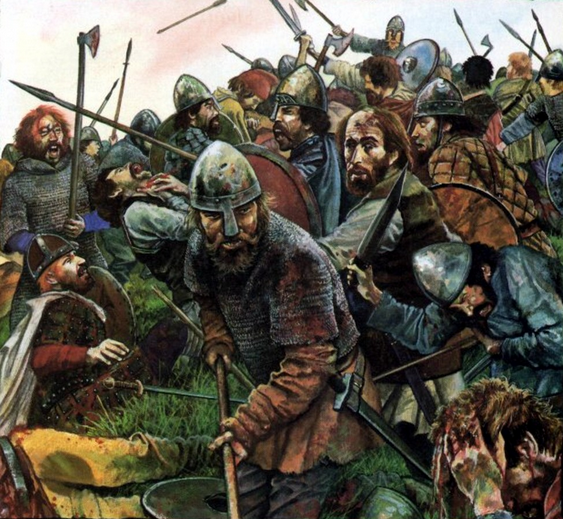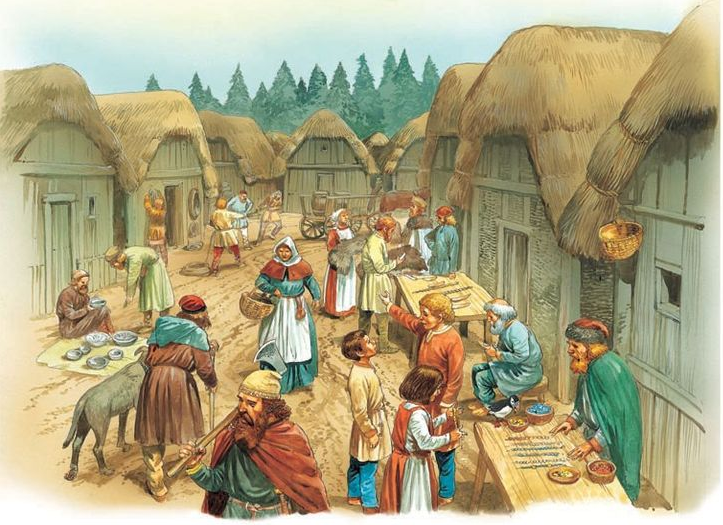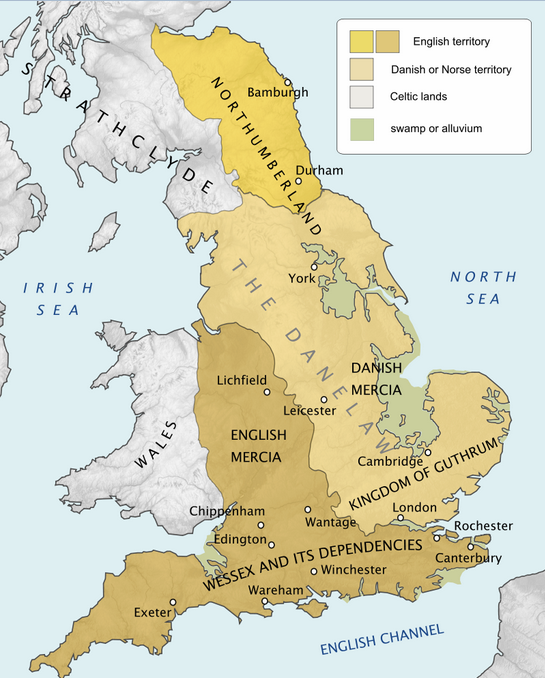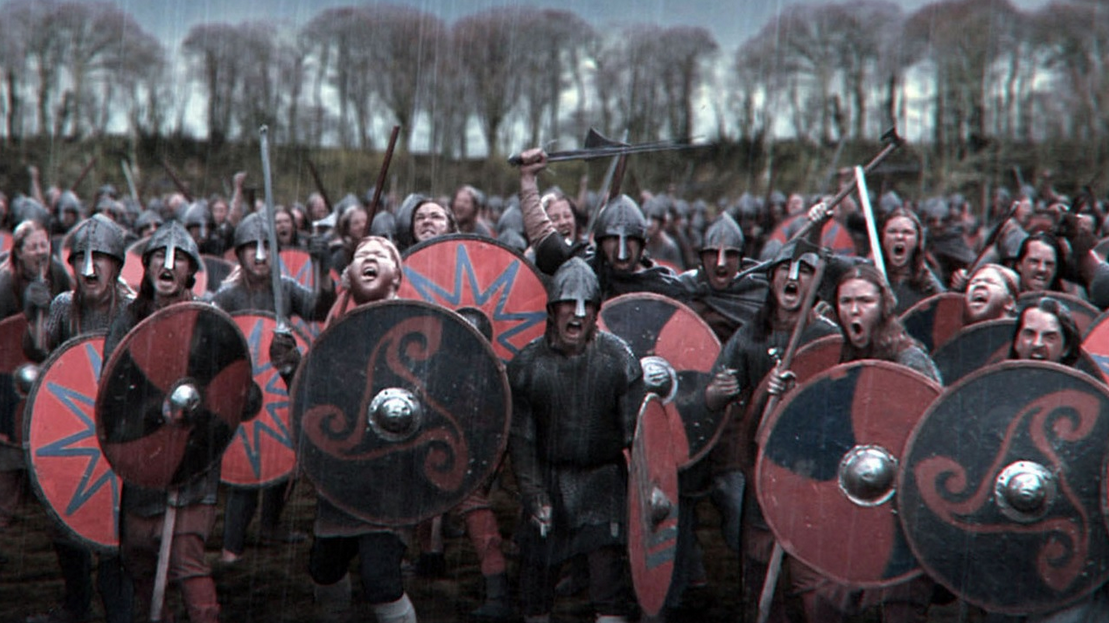Editor’s Note: This is the tenth chapter of Alfred the Great, by Jacob Abbot (published 1872).
X. The Victory Over the Danes
Encouraged by his dream, and animated by the number and the elation of his followers, Alfred led his army onward toward the part of the country where the camp of the enemy lay. He intended to surprise them; and, although Guthrum had heard vague rumors that some great Saxon movement was in train, he viewed the sudden appearance of this large and well-organized army with amazement.
He had possession of the hill near Edendune, which has been already described. He had established his head-quarters here, and made his strongest fortifications on the summit of the eminence. The main body of his forces were, however, encamped upon the plain, over which they extended, in vast numbers, far and wide. Alfred halted his men to change the order of march into the order of battle. Here he made an address to his men. As no time was to be lost, he spoke but a few words. He reminded them that they were to contend, that day, to rescue themselves and their country from the intolerable oppression of a horde of pagan idolaters; that God was on their side, and had promised them the victory; and he urged them to act alike men, so as to deserve the success and happiness which was in store for them.
The army then advanced to the attack, the Danes having been drawn out hastily, but with as much order as the suddenness of the call would allow to meet them. When near enough for their arrows to take effect, the long line of Alfred’s troops discharged their arrows. They then advanced to the attack with lances; but soon these and all other weapons which kept the combatants at a distance were thrown aside, and it became a terrible conflict with swords, man to man.

It was not long before the Danes began to yield. They were not sustained by the strong assurance of victory, nor by the desperate determination which animated the Saxons. The flight soon became general. They could not gain the fortification on the hill, for Alfred had forged his way in between the encampment on the plains and the approaches to the hill. The Danes, consequently, not being able to find refuge in either part of the position they had taken, fled altogether from the field, pursued by Alfred’s victorious columns as fast as they could follow.
Guthrum succeeded, by great and vigorous exertions, in rallying his men, or, at least, in so far collecting and concentrating the separate bodies of the fugitives as to change the flight into a retreat, having some semblance of military order. Vast numbers had been left dead upon the field. Others had been taken prisoners. Others still had become hopelessly dispersed, having fled from the field of battle in diverse directions, and wandered so far, in their terror, that they had not been able to rejoin their leader in his retreat. Then, great numbers of those who pressed on under Guthrum’s command, exhausted by fatigue, or spent and fainting from their wounds, sank down by the way-side to die; while their comrades, intent only upon their own safety, pressed incessantly on. The retreating army was thus, in a short time, reduced to a small fraction of its original force. This remaining body, with Guthrum at their head, continued their retreat until they reached a castle which promised them protection. They poured in over the drawbridges and through the gates of this fortress in extreme confusion; and feeling suddenly, and for the moment, entirely relieved at their escape from the imminence of the immediate danger, they shut themselves in.

The finding of such a retreat would have been great good fortune for these wretched fugitives if there had been any large force in the country to come soon to their deliverance, but as they were without provisions and without water, they soon began to perceive that, unless they obtained some speedy help from without, they had only escaped the Saxon lances and swords to die a ten times more bitter death of thirst and famine; and there was no force to relieve them. The army which had been thus defeated was the great central force of the Danes upon the island. The other detachments and independent bands which were scattered about the land were thunderstruck at the news of this terrible defeat. The Saxons, too, were every where aroused to the highest pitch of enthusiasm at the reappearance of their king and the tidings of his victory. The whole country was in arms. Guthrum, however, shut up in his castle, and closely invested with Alfred’s forces, had no means of knowing what was passing without. His numbers were so small in comparison with those besieging him that it would have been madness for him to have attempted a sally; and he would not surrender. He waited day after day, hoping against hope that some succor would come. His half-famished sentinels gazed from the watch-towers of the castle all around, looking for some cloud of distant dust, or weapon glancing in the sun, which might denote the approach of friends coming to their rescue. This lasted fourteen days. At the end of that time, the number within this wretched prison who were raving in the delirium of famine and thirst, or dying in agony, became too great for Guthrum to persist any longer. He surrendered. Alfred was once more in possession of his kingdom.
During the fourteen days that elapsed between the victory on the field of battle and the final surrender of Guthrum, Alfred, feeling that the power was now in his hands, had had ample time to reflect on the course which he should pursue with his subjugated enemies; and the result to which he came, and the measure which he adopted, evince, as much as any act of his life, the greatness, and originality, and nobleness of his character. Here were two distinct and independent races on the same island, that had been engaged for many years in a most fierce and sanguinary struggle, each gaining at times a temporary and partial victory, but neither able entirely to subdue or exterminate the other. The Danes, it is true, might be considered as the aggressors in this contest, and, as such, wholly in the wrong; but then, on the other hand, it was to be remembered that the ancestors of the Saxons had been guilty of precisely the same aggressions upon the Britons, who held the island before them; so that the Danes were, after all, only intruding upon intruders. It was, besides, the general maxim of the age, that the territories of the world were prizes open for competition, and that the right to possess and to govern vested naturally and justly in those who could show themselves the strongest. Then, moreover, the Danes had been now for many years in Britain. Vast numbers had quietly settled on agricultural lands. They had become peaceful inhabitants. They had established, in many cases, friendly relations with the Saxons. They had intermarried with them; and the two races, instead of appearing, as at first, simply as two hostile armies of combatants contending on the field, had been, for some years, acquiring the character of a mixed population, established and settled, though heterogeneous, and, in some sense, antagonistic still. To root out all these people, intruders though they were, and send them back again across the German Ocean, to regions where they no longer had friends or home, would have been a desperate—in fact, an impossible undertaking.

Alfred saw all these things. He took, in fact, a general, and comprehensive, and impartial view of the whole subject, instead of regarding it, as most conquerors in his situation would have done, in a partisan, that is, an exclusively Saxon point of view. He saw how impossible it was to undo what had been done, and wisely determined to take things as they were, and make the best of the present situation of affairs, leaving the past, and aiming only at accomplishing the best that was now attainable for the future. It would be well if all men who are engaged in quarrels which they vainly endeavor to settle by discussing and disputing about what is past and gone, and can now never be recalled, would follow his example. In all such cases we should say, let the past be forgotten, and, taking things as they now are, let us see what we can do to secure peace and happiness in future.
The policy which Alfred determined to adopt was, not to attempt the utter extirpation of the Danes from England, but only to expel the armed forces from his own dominions, allowing those peaceably disposed to remain in quiet possession of such lands in other parts of the island as they already occupied. Instead, therefore, of treating Guthrum with harshness and severity as a captive enemy, he told him that he was willing not only to give him his liberty, but to, regard him, on certain conditions, as a friend and an ally, and allow him to reign as a king over that part of England which his countrymen possessed, and which was beyond Alfred’s own frontiers. These conditions were, that Guthrum was to go away with all his forces and followers out of Alfred’s kingdom, under solemn oaths never to return; that he was to confine himself thenceforth to the south-eastern part of England, a territory from which the Saxon government had long disappeared; that he was to give hostages for the faithful fulfillment of these stipulations, without, however receiving on his part any hostages from Alfred. There was one other stipulation, more extraordinary than all the rest, viz., that Guthrum should become a convert to Christianity, and publicly avow his adhesion to the Saxon faith by being baptized in the presence of the leaders of both armies, in the most open and solemn manner. In this proposed baptism, Alfred himself would stand his godfather.
This idea of winning over a pagan soldier to the Christian Church as the price of his ransom from famine and death in the castle to which his direst enemy had driven him—this enemy himself, the instrument thus of so rude a mode of conversion, to be the sponsor of the new communicant’s religious profession—was one in keeping, it is true, with the spirit of the times, but still it is one which, under the circumstances of this case, only a mind of great originality and power would have conceived of or attempted to carry into effect. Guthrum might well be astonished at this unexpected turn in his affairs. A few days before, he saw himself on the brink of utter and absolute destruction. Shut up with his famished soldiers in a gloomy castle, with the enemy, bitter and implacable, as he supposed, thundering at the gates, the only alternatives before him seemed to be to die of starvation and phrensy within the walls which covered him, or by a cruel military execution, in the event of surrender. He surrendered at last, as it would seem, only because the utmost that human cruelty can inflict is more tolerable than the horrid agonies of thirst and hunger.

We can not but hope that Alfred was led, in some degree, by a generous principle of Christian forgiveness in proposing the terms which he did to his fallen enemy, and also that Guthrum, in accepting them, was influenced, in part at least, by emotions of gratitude and by admiration of the high example of Christian virtue which Alfred thus exhibited. At any rate, he did accept them. The army of the Danes were liberated from their confinement, and commenced their march to the eastward; Guthrum himself, attended by thirty of his chiefs and many other followers, became Alfred’s guest for some weeks; until the most pressing measures for the organization of Alfred’s government could be attended to, and the necessary preparations for the baptism could be made. At length, some weeks after the surrender, the parties all repaired together; now firm friends and allies, to a place near Athelney, where the ceremony of baptism was to be performed.
The admission of this pagan chieftain into the Christian Church did not probably mark any real change in his opinions on the question of paganism and Christianity, but it was not the less important in its consequences on that account. The moral effect of it upon the minds of his followers was of great value. It opened the way for their reception of the Christian faith, if any of them should be disposed to receive it. Then it changed wholly the feeling which prevailed among the Saxon soldiery, and also the Saxon chieftains, in respect to these enemies. A great deal of the bitterness of exasperation with which they had regarded them arose from the fact that they were pagan, the haters and despisers of the rites and institutions of religion. Guthrum’s approaching baptism was to change all this; and Alfred, in leading him to the baptismal font, was achieving, in the estimation not only of all England, but of France and of Rome, a far greater and nobler victory than when he conquered his armies on the field of Edendune.

The various ceremonies connected with the baptism were protracted through several days. They were commenced at a place called Aulre, near Athelney, where there was a religious establishment and priests to perform the necessary rites. The new convert was clothed in white garments—the symbol of purity, then customarily worn by candidates for baptism—and was covered with a mystic veil. They gave Guthrum a new name—a Christian, that is, a Saxon name. Converted pagans received always a new name, in those days, when baptized; and our common phrase, the Christian name, has arisen from the circumstance. Guthrum’s Christian name was Ethelstan. Alfred was his godfather. After the baptism the whole party proceeded to a town a few miles distant, which Alfred had decided to make a royal residence, and there other ceremonies connected with the new convert’s admission to the Church were performed, the whole ending with a series of great public festivities and rejoicings.
A very full and formal treaty of peace and amity was now concluded between the two sovereigns; for Guthrum was styled in the treaty a king, and was to hold, in the dominions assigned him to the eastward of Alfred’s realm, an independent jurisdiction. He agreed, however, by this treaty, to confine himself, from that time forward, to the limits thus assigned. If the reader wishes to see what part of England it was which Guthrum was thus to hold, he can easily identify it by finding upon the map the following counties, which now occupy the same territory, viz., Norfolk, Suffolk, Cambridgeshire, Essex, and part of Herefordshire. The population of all this region consisted already, in a great measure, of Danes. It was the part most easily accessible from the German Ocean, by means of the Thames and the Medway, and it had, accordingly, become the chief seat of the Northmen’s power.

Guthrum not only agreed to confine himself to the limits thus marked out, but also to consider himself henceforth as Alfred’s friend and ally in the event of any new bands of adventurers arriving on the coast, and to join Alfred in his endeavors to resist them. In hoping that he would fulfill this obligation, Alfred did not rely altogether on Guthrum’s oaths or promises, or even on the hostages that he held. He had made it for his interest to fulfill them. By giving him peaceable possession of this territory, after having, by his victories, impressed him with a very high idea of his own great military resources and power, he had placed his conquered enemy under very strong inducements to be satisfied with what he now possessed, and to make common cause with Alfred in resisting the encroachments of any new marauders.
Guthrum was therefore honestly resolved on keeping his faith with his new ally; and when all these stipulations were made, and the treaties were signed, and the ceremonies of the baptism all performed, Alfred dismissed his guest, with many presents and high honors.
There is some uncertainty whether Alfred did not, in addition to the other stipulations under which he bound Guthrum, reserve to himself the superior sovereignty over Guthrum’s dominions; in such a manner that Guthrum, though complimented in the treaty with the title of king, was, after all, only a sort of viceroy, holding his throne under Alfred as his liege lord. One thing is certain, that Alfred took care, in his treaty with Guthrum, to settle all the fundamental laws of both kingdoms, making them the same for both, as if he foresaw the complete and entire union which was ultimately to take place, and wished to facilitate the accomplishment of this end by having the political and social constitution of the two states brought at once into harmony with each other.
It proved, in the end, that Guthrum was faithful to his obligations and promises. He settled himself quietly in the dominions which the treaty assigned to him, and made no more attempts to encroach upon Alfred’s realm. Whenever other parties of Danes came upon the coast, as they sometimes did, they found no favor or countenance from him. They came, in some cases, expecting his co-operation and aid; but he always refused it, and by this discouragement, as well as by open resistance, he drove many bands away, turning the tide of invasion southward into France, and other regions on the Continent. Alfred, in the mean time, gave his whole time and attention to organizing the various departments of his government, to planning and building towns, repairing and fortifying castles, opening roads, establishing courts of justice, and arranging and setting in operation the complicated machinery necessary in the working of a well-conducted social state. The nature and operation of some of his plans will be described more fully in the next chapter.
In concluding this chapter, we will add, that notwithstanding his victory over Guthrum, and Guthrum’s subsequent good faith, Alfred never enjoyed an absolute peace, but during the whole remainder of his reign was more or less molested with parties of Northmen, who came, from time to time, to land on English shores, and who met sometimes with partial and temporary success in their depredations. The most serious of these attempts occurred near the close of Alfred’s life, and will be hereafter described.
The generosity and the nobleness of mind which Alfred manifested in his treatment of Guthrum made a great impression upon mankind at the time, and have done a great deal to elevate the character of our hero in every subsequent age. All admire such generosity in others, however slow they may be to practice it themselves. It seems a very easy virtue when we look upon an exhibition of it like this, where we feel no special resentments ourselves against the person thus nobly forgiven. We find it, however, a very hard virtue to practice, when a case occurs requiring the exercise of it toward a person who has done us an injury. Let those who think that in Alfred’s situation they should have acted as he did, look around upon the circle of their acquaintance, and see whether it is easy for them to pursue a similar course toward their personal enemies—those who have thwarted and circumvented them in their plans, or slandered them, or treated them with insult and injury. By observing how hard it is to change our own resentments to feelings of forgiveness and good will, we can the better appreciate Alfred’s treatment of Guthrum.
Alfred was famed during all his life for the kindness of his heart, and a thousand stories were told in his day of his interpositions to right the wronged, to relieve the distressed, to comfort the afflicted, and to befriend the unhappy. On one occasion, as it is said, when he was hunting in a wood, he heard the piteous cries of a child, which seemed to come from the air above his head. It was found, after much looking and listening, that the sounds proceeded from an eagle’s nest upon the top of a lofty tree. On climbing to the nest, they found the child; within, screaming with pain and terror. The eagle had carried it there in its talons for a prey. Alfred brought down the boy, and, after making fruitless inquiries to find its father and mother, adopted him for his own son, gave him a good education, and provided for him well in his future life. The story was all, very probably, a fabrication; but the characters of men are sometimes very strikingly indicated by the kind of stories that are invented concerning them.










[…] Source link […]
[…] Read Part 10 here […]